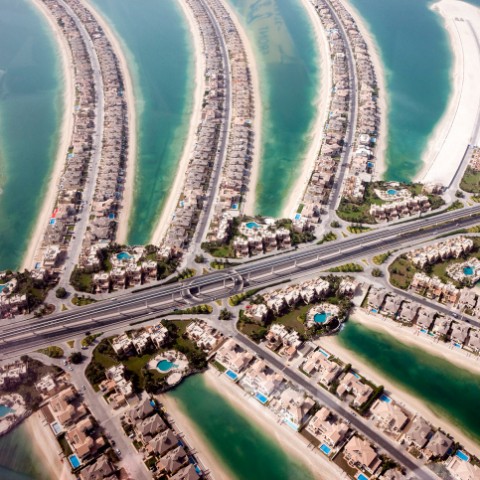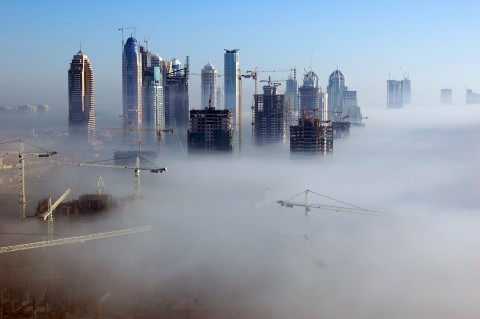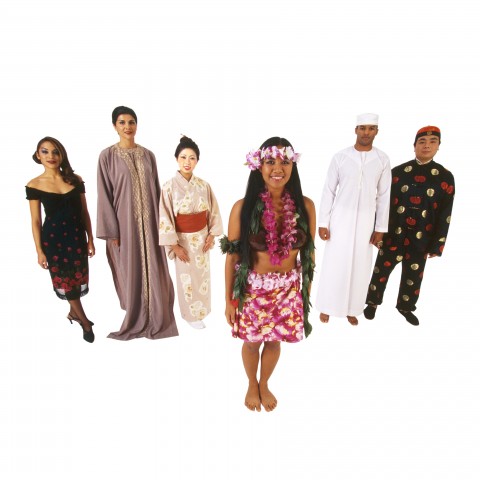Learn Arabic, they said. You’ll get a better job, they said.
The single biggest motivation for people learning a foreign language worldwide is employment.
And people have been watching with eyes wider and wider as Middle Eastern countries keep developing faster and faster.
Arabic, though? It’s supposed to be really hard!
You’d think that countries like those with such strong and vibrant local cultures would be totally closed off to outsiders, especially those that can’t speak the language.
Nothing could be further from the truth.
Aside from Arabic jobs, there are job opportunities for everyone in Arab countries, whether or not you speak Arabic!
How can you get your foot in the door? Read on.
Start with a bonus, and download the Business Words & Phrases PDF for FREE! (Logged-In Member Only)

Without further ado, here’s our guide on how to find a job in Arabic-speaking places.
Table of Contents
- Jobs For When You Can’t Speak Arabic Yet
- Jobs For When You Can Speak Arabic
- Four Hotspots You Might Not Have Considered
- How To Look For Jobs in the Middle East
- Four Job Boards You Should Be Checking Out
- Expat Communities
- Are You Sure You’re Done Learning Arabic?
1. Jobs For When You Can’t Speak Arabic Yet

You can’t speak Arabic yet, or you don’t know more than a few words or phrases? Join the club – the club is made up of the literally hundreds of thousands of expats in thriving Middle Eastern cosmopolitan cities, expats who can’t tell the Arabic alphabet from a plate of spaghetti.
With populations like that, there are definitely going to be services catered to the needs of English speakers instead of Arabic speakers.
In general, the skilled trades you can take advantage of in your home country are also in demand in others. If you’re really good at something pretty difficult, you can expect that local and foreign companies alike will be willing to sponsor your work visa.
What is “something pretty difficult?”
Medicine, for one. Let’s say you’re in Australia, and you’ve been working your fingers to the bone as a nurse but barely making ends meet.
Those skills you have are actually in high demand in, say, Saudi Arabia.
Medicine is the kind of thing that requires a strong tradition of expertise, and in fast-growing economies, the educational background just isn’t there yet. For that reason, international hospitals in Saudi Arabia are constantly hiring foreign talent whether or not they speak Arabic.
And outside of medicine, you’ll find opportunities in finance, tech, engineering, and more with the same characteristics. Big firms know that not everybody is willing to take on the challenge of a new language. That’s why they’ll go the extra mile to make you feel comfortable in English.
However, if you can speak Arabic, you open yourself up to all the monolingual jobs plus more.
2. Jobs For When You Can Speak Arabic

The most obvious job for a speaker of two languages has traditionally been translation or interpretation. However, making the big bucks in either of these fields takes experience and training.
Considering a career in Arabic translation? Why not specialize in medical or legal translation? As mentioned above, medicine is a booming industry. Carving out a niche for yourself means that you can relatively easily build up a portfolio of satisfied clients.
And just because executives speak English and other languages doesn’t mean there’s no use for Arabic. People publish market research and other industry information in Arabic all the time, and if you’re the one who can interpret and summarize it for somebody else, you’ll make yourself extremely valuable.
Perhaps one of the most frequently overlooked jobs for multilinguals is that of cultural liaison. Someone who really understands and can articulate the different needs, wants, and motivations of many different cultures is someone who can make any multinational business function ten times better.
Imagine that you’re managing a hotel in Bahrain and you have American tourists and local desk staff upset at one another over perceived slights. It would be a nightmare for any other manager – but you are confidently multilingual and have taken the time to understand just what everybody is mad about.
It’s not a job you can just up and apply for, but by highlighting your intercultural communication skills in your resume, you can play up this strength and feel satisfied knowing you helped people get along.
3. Four Hotspots You Might Not Have Considered
If you have a particular skill and the desire to relocate, chances are you can find a job. But suppose you’re one of those multi-talented types, with five years of experience here and seven years of experience there.
There might be fields you’re qualified for but overlooking. Here’s just a small sample of sectors in four Arab countries that are growing with remarkable speed.
1- Algeria: Telecommunications
The telecom industry in Algeria is wide open for investment, and that investment is coming like a tidal wave. Just this year, contracts were signed to push 5G coverage into the remotest provinces as well as expand fiber-optic communications lines across the country.
If you have any experience in telecom system management or information technology infrastructure development, Algeria wants you.
Will You Need Arabic?
Probably, or some French at the least. Algeria is not a country that ranks particularly highly when it comes to English ability among the general population. However, lots of people are multilingual in French, Amazigh, and Algerian Arabic. Much of the investment is coming from China, so some knowledge of Mandarin can’t hurt either.
2- UAE: Tech startups
The UAE, most prominently Dubai, is growing like crazy when it comes to tech. Investments in startups increased by a staggering seventeen times in just two years between 2014 and 2016. If you know something about data analysis, machine learning, or user interface design, your skills are going to be in high demand for sure.
Will You Need Arabic?
Probably not. All over the world, tech startups are increasingly being started-up by young and cosmopolitan people who grew up watching TV and surfing the Internet in English.
3- Dubai: Tourism and Hospitality
Here’s a fun little exercise for getting an Idea of the popularity of a particular place’s tourism industry.
Go on YouTube and search for that city, for example “Santa Monica” or “Dubai.” Just that one name. Then see where the results are from. Who’s shooting their vlogs there?
When it comes to Dubai, the answer is “everyone.” Taiwan, Poland, South Africa, Australia, Germany… it’s a worldwide tourist destination.
Will You Need Arabic?
Probably not. International hotel and resort chains frequently use English as the language of business. However, knowing how to speak the language or languages of your staff makes an enormous difference when it comes to management. There’s a chance that will be Arabic in Dubai, but knowledge of South or Southeast Asian languages might go a little farther.
4- Saudi Arabia: Real Estate
Construction and development is absolutely soaring in Saudi Arabia.
And just as in the medical sector, real estate companies are searching for top talent. You need to be someone with years of experience, even better if your career spans multiple levels of real estate management.
Will You Need Arabic?
It depends on the market that you end up in. It’s entirely possible that you can secure a position in which you’re not expected to interact with monolingual clients, or if absolutely necessary you can use an interpreter.
If you happen to speak truly excellent Arabic, you may be tasked with the all-important job of negotiation – in which case your cultural knowledge had better be at least as good as your language knowledge.
4. How To Look For Jobs in the Middle East

A very important concept when talking about business in the Middle East is connections.
Do you have them? Even if you think you don’t, is it possible someone you used to know ended up working in an Arab country or even has relatives there?
There’s your connection. Even something as tenuous as “a good friend of my high school girlfriend’s uncle” is a possible lead, and believe it or not it carries as much or more weight than an impressive cold call.
But don’t think of the whole Arab world as a place stifled by nepotism. Thousands of people can and regularly do get jobs just by posting their resumes on job boards or cold-emailing a company representative.
One thing you’ll definitely need for this is a tailored CV. (If you think that’s obvious, congratulations – you’re already well ahead of the curve.)
HR departments and recruiters in the Middle East tend to like fancier, lengthier CVs than people do in the west. Put some thought into the design, and don’t shy away from flowery language to spice up the details of your work experience.
You’ll also want to include personal information like age, gender, and nationality. Photos are important too. Plenty of people will rule out applicants if they don’t fit the exact physical description mentioned in the job posting.
Where exactly can you find all these job postings?
5. Four Job Boards You Should Be Checking Out
1- Expat.com
Expat.com is a very valuable resource for people looking to move anywhere, not just the Middle East. In addition to a thriving job board, there’s also an active forum with advice from people who have seen and done it all before.
2- Bayt
Bayt bills itself as “The Middle East’s Leading Job Site,” and it certainly has the numbers to back that up. Tens of thousands of jobs are posted and filled every month! There’s also a very helpful advice blog and CV resource center – both full of advice on putting your best face forward to a very different culture.
3- Naukrigulf
This job site might not be as slick as Bayt, but Naukrigulf has just as big a presence. It’s extremely easy to hop on and browse all kinds of different categories, sorting by more than a dozen different requirements. At the time of this writing, five thousand jobs were added in the last seven days alone!
4- Wuzzuf
Are you looking specifically for an Egyptian job? Wuzzuf is the largest job board in Egypt, though of course it also has listings for nearby countries. The advantage of a more local board like this is that you can directly apply to Egyptian companies specifically instead of larger multinational corporations that might be more willing to hire internally.
Whatever you do, don’t turn to Craigslist as you might be tempted to. Craigslist, even in big cities of the Middle East, just isn’t used that much, and what you find on there is likely to be under-the-table at best and an outright scam at worst.
6. Expat Communities
There’s an interesting trend I’ve noticed about people living abroad. Lots of people don’t like the idea of being an expat, though they certainly like the idea of enjoying its benefits.
Lots of Westerners simply walk past each other without trying to make eye contact on the street, even in a place where they are clearly the only non-locals around. It can be kind of alienating!
Fortunately, that’s not always the case. Social media is a fantastic place these days for connecting with other foreigners in your land, and you will almost certainly be welcomed with open arms.
After all, as expats you’re facing a unique set of circumstances in the country that locals really can’t comprehend.
Facebook is by far the biggest place to make these connections. Simply search for “expats in X” and you’ll find lively groups that post anything from coping advice to job offers to upcoming events. Don’t be afraid to join national expat groups too if your local city group is small or nonexistent.
The more connections you can make, the better. When everybody is a stranger in a strange land, they’re all willing to help.
7. Are You Sure You’re Done Learning Arabic?
You know, even if you’re quite comfortable working in Arabic, there’s always room to improve.
And although many people speak other languages, the fact is that knowing the local language wherever you go is a huge advantage, even just psychologically speaking.
It eventually takes a bit of a mental toll to constantly block out the incomprehensible stream of noise or text you see all around you and constantly look for whatever you can understand.
But it doesn’t have to be that way.
ArabicPod101 offers a comprehensive self-study program for the Arabic language. Although pod is in the name, it’s really far more than just a podcast. It’s an entire course delivered in the form of audio lessons, vocabulary resources, and written materials available on the website.
It’s totally painless to try out. Get started today, and give yourself the best leg up on a job in an Arab country!
Author: Yassir Sahnoun is a HubSpot certified content strategist, copywriter and polyglot who works with language learning companies. He helps companies attract sales using content strategy, copywriting, blogging, email marketing & more.





























